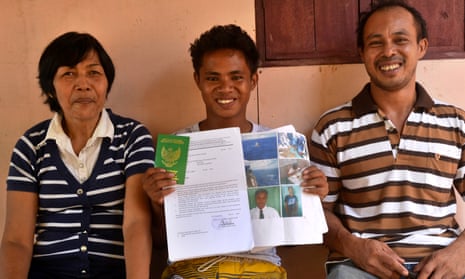It was seven in the morning when he felt the jolt. His wooden hut, tethered to the sea floor, had been lurching ominously as heavy winds whipped up the waves around it.
He thought he had felt the anchor rope break, but he wasn’t sure until he saw that the hut had moved – unnerving confirmation that he was adrift in the ocean.
Aldi Novel Adilang, 18, picked up his walkie-talkie and radioed a message to his friends. “Phone the boss,” he told them over the crackly connection. “My anchor has snapped.”
Employed on floating fishing huts known locally as rompong, Aldi and his friends would often spend months at a time out at sea, 75 miles from the Indonesian shore. Their job each night was to light the lamps strung around the huts to lure fish to the traps below.
To cope with the isolation they would amuse each other by telling jokes and stories over their walkie-talkies. There was no phone signal, but on rompong less than five miles apart the radios worked.
In the two years that Aldi, from the island of Sulawesi, had been doing the job, his anchor had broken twice before, so when it happened again on 14 July he didn’t immediately panic. He had no idea he was about to embark on a tumultuous 49-day ordeal in which he would survive off raw tuna, rainwater and, at the lowest point, by sipping seawater through his clothes.
“On the first day I was OK, I wasn’t stressed or panicking. I knew they would send a boat but I was worried it would have to turn back because the winds and the waves were strong,” he told the Guardian. “It was after more than a week that I started to get very scared.”
Aldi said he had about a month’s worth of supplies – rice, spices, coconut oil, fuel for the generator and a drum of fresh water – when the anchor broke.
In the first weeks, he would busy himself by fishing – mostly catching tuna – scanning the horizon for boats and singing gospel songs. Initially he would boil or grill his catch, and when the gas ran out he started to burn bits of wood from the hut so he could cook. In the end he just ate it raw.
As he floated thousands of miles away from home across the Pacific Ocean, Aldi drew up a calendar in his notebook, marking off the days so he didn’t lose track of time. As the days of endless horizon dragged on, he grew increasingly desperate.
“There were times when I crying and thinking about killing myself,” he said. “When I was crying the only consolation I had was reading the Bible.” He worked his way through the books of Matthew, John, Isaiah, Genesis and Psalms. Matthew chapter 6 verse 9, the opening of the Lord’s prayer, particularly stuck in his mind.
Without a compass or GPS, Aldi had no idea where he was or how long he might be there. “The hardest thing was the thought that I would never see my parents again,” he said, twisting his shirt around his hands. “That I would never see my island again, and never make it home alive.”
Aldi had taken the rompong job at the age of 16, before he even knew how to swim. At the time he thought his monthly salary of 2m rupiah (£102) was decent, but it didn’t seem worth it as he drifted in the ocean, an existence punctuated by soul-crushing moments.
The first came a few weeks in when an Indonesian ship sailed by. Aldi managed to talk to the captain by walkie-talkie, who promised they would turn around and get him after finishing work for the day. They didn’t return.
Polite and soft-spoken, Aldi showed no anger at the recollection. Flown into Jakarta to appear on a national talkshow, his first time in the capital, he seemed somewhat bewildered by all the attention – or perhaps it was just the fact he had survived.

One of the worst parts of the ordeal – scarier than the sharks that regularly circled his hut – was when he ran out of water. Aldi survived by dipping his shirt into the ocean and sipping the seawater through the cloth, in the hope that it would reduce the amount of salt he would consume.
He lived like that for four days, until finally it rained. That saw him through to day 49, when he was rescued by a Panamanian-flagged vessel, MV Arpeggio.
“When I saw the boat I was waving my towel at them in the air and over the radio I was saying ‘help, help’ because I knew that word in English,” Aldi said. “The ship had already passed by me, about one mile, but then they turned around and picked me up.”
Video shot from the ship shows Aldi’s small hut bobbing in the ocean, and the weakened teenager being hauled up a wooden ladder on to the deck, where the crew rushes to bring him a blanket and fresh water. Onboard, he later told his story to the crew via Google Translate.
The boat was heading to Japan, so the ship’s captain made arrangements for Indonesian embassy officials to pick up Aldi in Tokuyama, almost two months after his nightmare had begun.
On the train to Tokyo, he made a long-awaited video call home. “We were crying so much the officials from the embassy cut the call short,” Aldi said with a laugh. “They said you cannot be noisy like that on a train in Japan.”
With the adventure behind him, Aldi said he would be staying on land. For now he is just grateful to be turning another year older. On Sunday, he will celebrate his 19th birthday.
